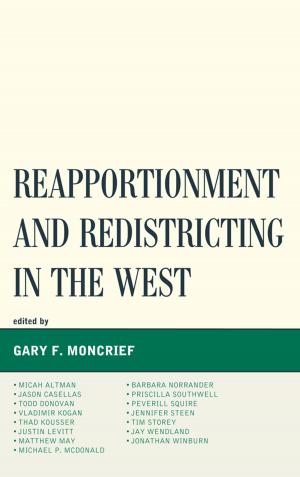Italian Critics of Capitalism
Nonfiction, Social & Cultural Studies, Political Science, International, Foreign Legal Systems, History, Italy, Politics, History & Theory| Author: | ISBN: | 9780739142363 | |
| Publisher: | Lexington Books | Publication: | March 31, 2010 |
| Imprint: | Lexington Books | Language: | English |
| Author: | |
| ISBN: | 9780739142363 |
| Publisher: | Lexington Books |
| Publication: | March 31, 2010 |
| Imprint: | Lexington Books |
| Language: | English |
Over the last hundred years the history of capitalism hardly supports the idea of a dynamic equilibrium between democracy and capitalism. The unprecedented triumph of global capitalism and its stronger power of transformation are changing the nature of political community and its institutions, transforming the conditions of democratic politics and governance. The writings collected in this volume present leading statements of theories of democracy and capitalism in Italy starting from Vilfredo Pareto who firstly focused on the transformation of democracy into a plutocracy in which vested interests use the government as a tool for their own profit, until Norberto Bobbio who expressed a strong defence of democracy and a deep critique of capitalism. As Marx, Weber, and Schumpeter-from different perspectives-have pointed out capitalism rather then just an economic mode of organization, is a 'mentality', a 'social logic', a 'form of living', that influences and reshapes political structures, and culture. The globalized economic order is challenging the foundations and political principles upon which liberal democracy is based. Global markets have unleashed economic forces that are becoming too powerful for democratic institutions to control. Even if the formal elements of democracy still survive, the 'government by the people, for the people' is declining; elections, debates, parties, are evacuated, and bypassed by new, less accountable processes.
Over the last hundred years the history of capitalism hardly supports the idea of a dynamic equilibrium between democracy and capitalism. The unprecedented triumph of global capitalism and its stronger power of transformation are changing the nature of political community and its institutions, transforming the conditions of democratic politics and governance. The writings collected in this volume present leading statements of theories of democracy and capitalism in Italy starting from Vilfredo Pareto who firstly focused on the transformation of democracy into a plutocracy in which vested interests use the government as a tool for their own profit, until Norberto Bobbio who expressed a strong defence of democracy and a deep critique of capitalism. As Marx, Weber, and Schumpeter-from different perspectives-have pointed out capitalism rather then just an economic mode of organization, is a 'mentality', a 'social logic', a 'form of living', that influences and reshapes political structures, and culture. The globalized economic order is challenging the foundations and political principles upon which liberal democracy is based. Global markets have unleashed economic forces that are becoming too powerful for democratic institutions to control. Even if the formal elements of democracy still survive, the 'government by the people, for the people' is declining; elections, debates, parties, are evacuated, and bypassed by new, less accountable processes.















